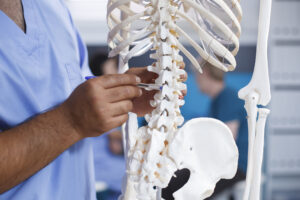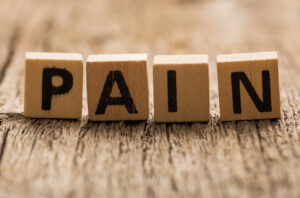Herniated disc pain can be a debilitating and often unpredictable condition that affects the spine. It can occur in various areas of the back and can lead to a range of symptoms, including localized pain, numbness, and tingling sensations.
As a board-certified spine specialist, I understand how debilitating herniated disc pain can be. That is why I think it is important to educate my patients on all aspects of the condition, and how my team and I can help with herniated disc pain relief.
What is a Herniated Disc?
A herniated disc, also known as a slipped or ruptured disc, is a condition that occurs when the soft, jelly-like center of a spinal disc pushes through a crack in the tougher outer layer of the disc. This can cause pressure on nearby nerves, leading to pain, weakness, or numbness in the back or limbs.
Signs and Symptoms
The signs and symptoms of a herniated disc can vary depending on the location and severity of the herniation.
Back pain: Herniated discs in the lower back can cause severe back pain, which may be exacerbated by movement. This pain may radiate down into the buttocks or thighs.
Leg pain: Herniated discs in the lower back can also cause pain that radiates down the leg, known as sciatica. This pain may be accompanied by numbness or tingling in the affected leg.
Arm pain: Herniated discs in the neck can cause pain that radiates down the arm, often accompanied by numbness or tingling.
Weakness: Herniated discs can cause weakness in the affected area, making it difficult to perform daily activities.
Causes of Herniated Discs
Age: As we age, the spinal discs lose some of their water content, making them less flexible and more susceptible to injury.
Trauma: Trauma to the spine, such as a fall or car accident, can cause a herniated disc.
Repetitive Strain: Repetitive strain, such as lifting heavy objects repeatedly, can put stress on the spinal discs and increase the risk of herniation.
Diagnosis and Treatment
The diagnosis of a herniated disc usually involves a physical examination and imaging tests, such as an X-ray, MRI, or CT scan. There are several treatment options available for herniated discs, depending on the severity of the condition and your individual need.
Physical therapy: Physical therapy can help to alleviate pain and improve flexibility and strength in the affected area. This can involve exercises and stretches to relieve pressure on the affected nerve and strengthen the muscles around the spine. Therapies like ice, heat, electrical stimulation, and traction can also be used to manage pain and inflammation.
Medications: Pain medications and anti-inflammatory medications may be prescribed to alleviate pain and reduce inflammation. In some cases, muscle relaxants or nerve pain medications may also be prescribed.
Injections: Corticosteroid injections can be administered to reduce inflammation and alleviate pain. These injections are delivered directly to the affected area to provide targeted relief.
Surgery: In severe cases, surgery may be necessary to remove the herniated disc and relieve pressure on the nerve.

Preventing Herniated Discs
While herniated discs cannot always be prevented, there are steps that can be taken to reduce the risk of developing the condition. Maintaining good spinal health is essential to prevent herniated discs.
Maintain good posture: Good posture can help to reduce strain on the spine and prevent herniated discs. This can involve sitting and standing up straight and avoiding slouching or hunching. It is also important to ensure that the workstation is ergonomically designed to avoid undue stress on the spine.
Exercise regularly: Regular exercise can help to strengthen the muscles surrounding the spine and improve flexibility. This can include activities such as walking, swimming, or yoga. Core strengthening exercises like planks, bridges, and bird dogs can also help to protect the spine from injury.
Lift properly: When lifting heavy objects, it is important to use proper lifting techniques to avoid straining the spine. This involves bending at the knees and using the legs to lift, rather than bending at the waist. Additionally, avoid twisting the spine while lifting and carrying objects.
Quit smoking: Smoking can weaken the discs in the spine, increasing the risk of herniation. Quitting smoking can help to reduce the risk of developing a herniated disc and promote overall spinal health.
Maintain a healthy weight: Excess weight can place additional stress on the spine, increasing the risk of herniation. It is important to maintain a healthy weight through a balanced diet and regular exercise.
Stay hydrated: The spinal discs are composed of water and require proper hydration to function optimally. Dehydration can cause the spinal discs to lose their elasticity and resilience, making them more prone to injury.

Wave Goodbye to Back Pain
If you are experiencing herniated disc pain that is causing a decrease in your quality of life and preventing you from doing the things you enjoy, contact us today to schedule a consultation. My team and I are dedicated to providing expert care and support and have extensive experience with herniated disc pain relief.
We prioritize clear communication and personalized attention for each of our patients and strongly believe in the benefits of preventive care and minimally invasive surgeries. Our goal is to work with you to develop a comprehensive treatment plan that addresses your specific needs and goals. We conduct many of our surgeries at our facility ensuring that you receive expert care in a comfortable and convenient setting.

















